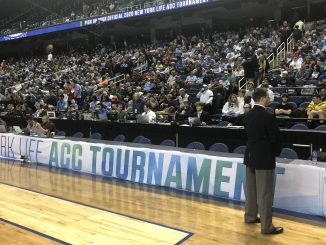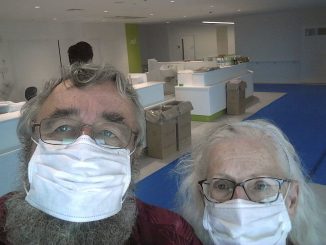RALEIGH — When indoor gyms and fitness facilities shut down last spring due to the coronavirus, millions of Americans turned to the safety of outdoor activities like walking, biking and running instead. Yet the pandemic’s impact on the organized road-race industry this year has been utterly devastating. The Wall Street Journal recently highlighted a study by Athlinks, the industry’s main results platform, which found that the number of finishers in timed races nationwide dropped nearly 95% between mid-March and mid-October compared with the same span last year. This drop is understandable given the atmosphere of these types of events, which is anything but social distance-friendly. (Think: thousands of sweaty athletes packed like sardines at the start and finish lines not to mention the thousands of spectators watching alongside the course.)
Before the pandemic struck the running industry was on the upswing. The number of finishers in timed events was up 3% in early 2020, yet what used to be 5,000 person events, have now been capped at a couple of hundred, people and that is in best case scenarios where races even take place. Marathons and other road races technically fall into the same category as large outdoor gatherings like concerts and festivals, which lawmakers and public health officials continue to regulate.
Even still, race directors say they are studying how and when events can safely resume and are already looking to bring back smaller events as early as the spring. For example, Raleigh-based running company Capstone Event Group, which operates around 16 races a year in over six states across the country as well as in Vancouver, says it is certainly looking promising that they will be able to host some of their 2021 Springtime resort races at locations such as Pinehurst and the Greenbrier. President and COO Charlie Mercer says that Capstone’s destination and resort-based runs are by nature smaller events where the number of participants is already capped at a few hundred runners, versus some of their larger events where the number of participants often reaches into the tens of thousands.
Mercer says COVID has forced race organizations to make operational changes, some of which may become a part of the way races are executed for years to come. These include more staggered start times, spread out water stations with volunteers standing farther apart from each other, and staff who deliver race packets to participants’ individual hotel rooms as is the case for Capstone’s upcoming resort races. “And of course, the post-race parties will have to change to incorporate more social distancing,” Mercer adds.
Founded in 2011 by Raleigh native John Kane, Capstone is a homegrown success story that continues to expand its portfolio of race offerings. It not only hosts some of the Triangle’s most well-known running events like Bull City Race Fest, Raleigh’s City of Oaks Marathon, the Tarheel Ten Miler, and the Race 13.1 half marathon series – which includes two events in Raleigh, one in Durham, and one in Charlotte, but it also hosts two marathons in South Carolina, a half marathon in Sea Island, GA., the Bay to Breakers run in San Francisco, and events in St. Louis and the Hamptons. Mercer says because of they operate in so many locales he has seen firsthand how COVID has impacted various communities differently.
“As we head into 2021, we have to use a different set of metrics to size up what each of next year’s races will look like based on how COVID is impacting a certain host community.”
Charlie Mercer, President and COO of Capstone Event Group
“We’ve seen this not only from a local N.C. perspective, but also from the way COVID has impacted the other regions of the country where we host races. Our operational managers are taking extra precautions as we plan 2021 events, and we believe there is a strong possibility we will be able to operate some in person events in Spring, 2021 depending on the size of the event and its geographic location.”
Capstone’s events serve over 100,000 runners annually but when COVID hit this past March they too were forced to cancel everything scheduled for the rest of the year. They were able to produce the Charleston Marathon, Pinehurst Half Marathon and Myrtle Beach Marathon before COVID hit. Nationwide, about 15% of runners this year converted their event to a virtual one after the in-person versions were canceled. A virtual race has participants run the prearranged distance wherever they want and submit their times to organizers. Participants in the virtual New York City Marathon, for example, ran 26.2 miles any day between Oct. 17 and Nov. 1. There are no winners or prizes involved with virtual events.
“As we head into 2021, we have to use a different set of metrics to size up what each of next year’s races will look like based on how COVID is impacting a certain host community,” Mercer explains. “Our Resort Race series, where events are capped at 500 or 750 participants, have a strong likelihood of happening as planned in Spring, 2021, whereas we’ve already moved the date of our 30,000 person San Francisco event from May, 2021 to August, 2021.”
Mercer says that his business background from his previous career at Deloitte, where he was able to learn about the complex US healthcare system, made him appreciate the importance of organizations that help people improve their physical health which can ultimately help prevent some of the health problems that lead to significant utilization of the healthcare system. “But I’ve come to appreciate the numerous other benefits of running events, such as their ability to build community, help local businesses and improve participants’ confidence and mental health,” he says.
For this reason, Mercer is confident the running industry will rebound from the pandemic and that when things return to normal their races will continue to mean a lot to people moving forward. “We’re staying optimistic and just focusing on delivering meaningful experiences to people that create positive change in their lives.”


